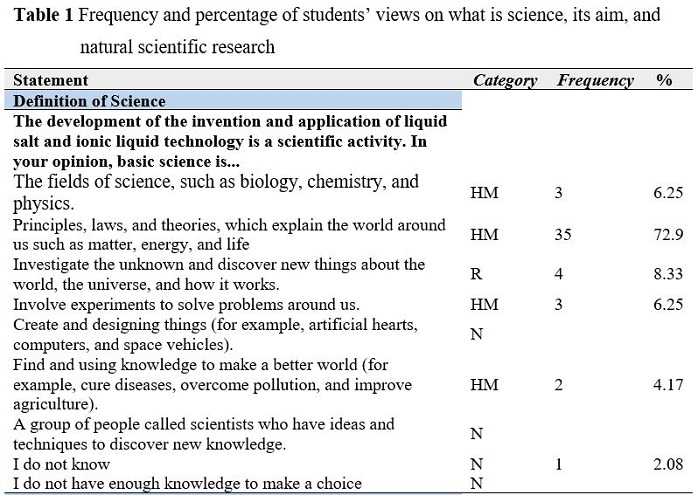
Exploring View of Nature of Science and Technology Pre-Service Chemistry Teachers
Abstract
Full Text:
DOWNLOAD PDFReferences
Aikenhead, G. S., Ryan, A. G., & Fleming, R. W. (1989). Views on science-technology-society. Social Science and Humanities Research Council.
Aikenhead, G. S., & Ryan, A. G. (1992). The development of a new instrument:‘Views on Science—Technology—Society’(VOSTS). Science education, 76(5), 477-491.
Ayvaci, H. S., & Ozbek, D. (2019). The Effect of Documentary Films on Preservice Science Teachers' Views of Nature of Science. Journal of Science Learning, 2(3), 97-107.
Bybee, R., & McCrae, B. (2011). Scientific literacy and student attitudes: Perspectives from PISA 2006 science. International Journal of Science Education, 33(1), 7-26.
Fernandes, G. W. R., Rodrigues, A. M., & Ferreira, C. A. (2018). Conceptions of the nature of science and technology: a study with children and youths in a non-formal science and technology education setting. Research in Science Education, 48(5), 1071-1106.
Gardner, P. L. (1999). The representation of science-technology relationships in Canadian physics textbooks. International Journal of Science Education, 21(3), 329-347.
Herman, B. C. (2013). A convergence of Postman and Vygotsky perspectives regarding contemporary media’s impact on learning and teaching. The nature of technology (pp. 291-328). Brill Sense.
Kusuma, D. C., Mudzakir, A., & Widhiyanti, T. (2019). Pre-service chemistry teachers’ VNOST and their conceptions about the context of OLED and related chemistry contents. In Journal of Physics: Conference Series (Vol. 1157, No. 4, p. 042037). IOP Publishing.
Lacey, H. (2012). Reflections on science and technoscience. Scientiae studia, 10(SPE), 103-128.
Lederman, N. G. (1992). Students' and teachers' conceptions of the nature of science: A review of the research. Journal of research in science teaching, 29(4), 331-359.
Lederman, N. G., Lederman, J. S., & Antink, A. (2013). Nature of science and scientific inquiry as contexts for the learning of science and achievement of scientific literacy. International Journal of Education in Mathematics Science and Technology, 1(3), 138-147.
Lokollo, L., Hernani, H., & Mudzakir, A. (2019). Pre-service chemistry teacher’s view about the nature of science and technology. In Journal of Physics: Conference Series (Vol. 1157, No. 4, p. 042036). IOP Publishing.
Mansour, N. (2010). Science teachers’ perspectives on science-technology-society (STS) in science education. Eurasian Journal of Physics and Chemistry Education, 2(2), 123-157.
Mc Ginn, R. E. (1991). Science and technology, and society (No. 303.483 M4599s Ej. 1). Prentice Hall.
Mudzakir, A., Widhiyanti, T., Hernani, Arifin, M., Lestari, A. N., & Jauhariansyah, S. (2017, August). The nature of science and technology for pre-service chemistry teacher: A case of techno-chemistry experiment “From Stannum Metalicum to conductive glass.” In AIP Conference Proceedings (Vol. 1868, No. 1, p. 030015). AIP Publishing.
Murcia, K., & Schibeci, R. (1999). Primary student teachers' conceptions of the nature of science. International journal of science education, 21(11), 1123-1140.
OECD, P. (2016). Results (Volume I): Excellence and equity in education.
Palmquist, B. C., & Finley, F. N. (1997). Preservice teachers' views of the nature of science during a postbaccalaureate science teaching program. Journal of Research in Science Teaching: The Official Journal of the National Association for Research in Science Teaching, 34(6), 595-615.
Rotherham, A., & Willingham, D. (2010). New, but a Worthy Challenge. American Educator, 17-20.
Rubba, P. A., & Harkness, W. L. (1993). Examination of Preservice and In-service Secondary Science Teachers' Beliefs about Science-Technology-Society Interactions. Science Education, 77(4), 407-31.
Rubba, P. A., & Harkness, W. J. (1996). A new scoring procedure for the Views on Science‐Technology‐Society instrument. International Journal of Science Education, 18(4), 387-400.
Shwartz, Y., Ben‐Zvi, R., & Hofstein, A. (2005). The importance of involving high‐school chemistry teachers in the process of defining the operational meaning of ‘chemical literacy.’ International Journal of Science Education, 27(3), 323-344.
Tairab, H. H. (2001). How do pre-service and in-service science teachers view the nature of science and technology?. Research in Science & Technological Education, 19(2), 235-250.
DOI: https://doi.org/10.17509/jsl.v3i1.17757
Refbacks
- There are currently no refbacks.
Copyright (c) 2019 Devita Marlina Venessa, Hernani Hernani, Heli Siti Halimatul

This work is licensed under a Creative Commons Attribution-ShareAlike 4.0 International License.


Jl. Dr. Setiabudhi 229 Bandung 40154, West Java, Indonesia











